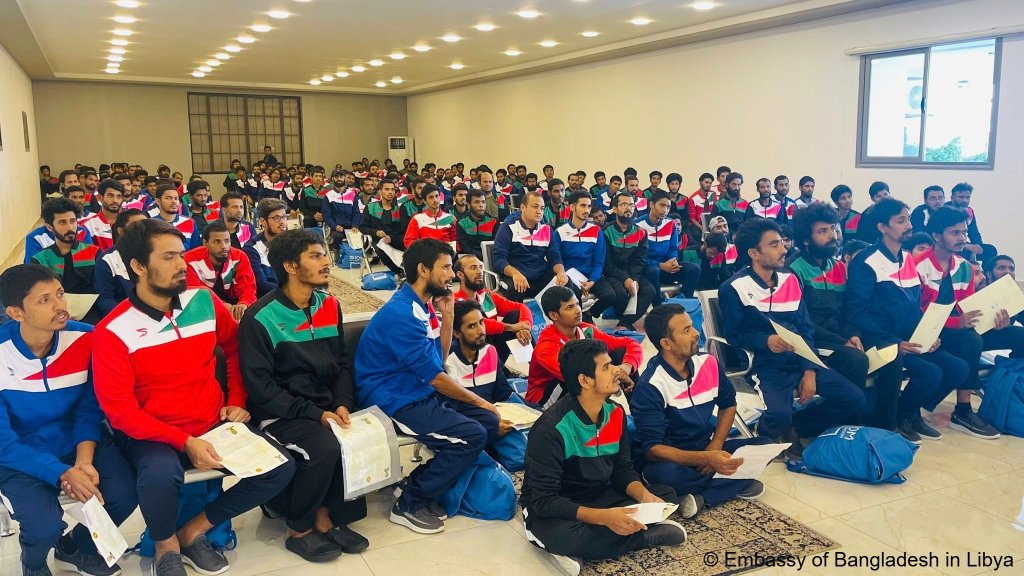The Libyan Directorate for Combating Illegal Migration (DCIM) announced on Monday that it had repatriated 207 Egyptian migrants found to be in Libya without papers. Late last week, DCIM also sent back a group of 176 Bangladeshi nationals who had been detained in Libya.
A group of 207 Egyptian nationals were deported via the land border on Monday (September 22) from Libya back to Egypt. The group, said Libya’s Deportation Office of the Directorate for Combating Illegal Migration (DCIM), were in Libya "illegally" and were deported after "violating applicable laws."
The group was deported "in the presence of members from the Egyptian Embassy," reported the English language news portal Libya Update. Pictures of the group waiting in a hall and climbing onto a bus were also made available via the picture agency Picture Alliance.
The Egyptian embassy in Libya issued the group with travel documents so they could return home.
Read AlsoLibya: Nearly 15,000 migrants intercepted and returned since start of the year
Repatriations to Bangladesh
Late last week, the DCIM, in collaboration with Bangladeshi officials, also sent home 176 Bangladeshi nationals.
The group, officials at the Bangladeshi embassy told InfoMigrants Bengali, had been "detained, tortured and kidnapped in Libya" before being sent back home.
The group of Bangladeshi nationals landed safely on a Buraq Airlines flight in Dhaka on Thursday morning (September 18), confirmed Bangladeshi officials.
All of those on board the flight, stated Bangladeshi officials, had been held at the Tajura Detention Center in Tripoli, prior to their departure. The UN Migration Agency IOM also helped facilitate the repatriation.

An embassy official informed InfoMigrants Bengali that between June 2023 and August 29, 2025, a total of 5,878 Bangladeshi nationals were repatriated from Libya with assistance from the IOM. Since 2017, the number of Bangladeshis returned from Libya has reached "at least 10,000, highlighting the scale of migration challenges in the region."
Read AlsoLibya: Eastern authorities deport 700 Sudanese migrants
UNHCR hotline for those detained in Libya
The UN Refugee Agency (UNHCR) continually calls for the release of refugees and asylum seekers who are being held arbitrarily in detention in Libya. They also advocate for the establishment of a judicial review system to develop alternatives to detention in the country, stated a press release from the UN agency.

According to the UN agency, officials working with UNHCR Libya visit official detention centers that fall under DCIM's jurisdiction to offer "life-saving medical and humanitarian assistance." They also aim to secure access to people in the centers for the purpose of monitoring, identification, verification and advocacy for their release.
UNHCR also offers a UNHCR protection hotline (0917127644) that can be contacted if you believe one of your relatives is being held in a Libyan detention center. If a relative is located during one of UNHCR's visits to the centers, you will be contacted to inform you of their whereabouts and any updates on their case, provided your relative consents.
Since the beginning of the year, Libyan authorities have intercepted more than 17,000 migrants at sea and returned them to Libya, according to IOM data. Many of those returned are then detained in Libya. Some of those detained might eventually be repatriated, others might be offered a possibility, often reportedly following periods of torture and mistreatment, to buy themselves out of detention and try once more to cross the Mediterranean.
NGOs and UN agencies continually underline that Libya cannot be regarded as a safe country, and migrants should not be returned there because of the likelihood that they might suffer this kind of treatment.
In June this year, the IOM said that it had reached a "milestone" of helping with the voluntary repatriation of 100,000 migrants since launching its Voluntary Returns Program in Libya in 2015.
With additional reporting by Tanjir Mehedi
Read AlsoLibya's coast guard has intercepted and returned nearly 21,000 migrants in 2024
